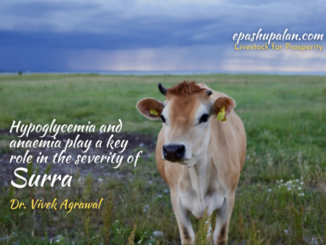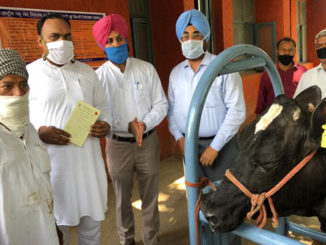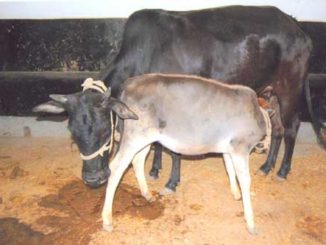Introduction
Water intoxication is a condition that occurs when excessive quantities of water are ingested by very thirsty animals. It commonly occurs in animals that have been subjected to severe exercise or high environmental temperatures
Animals affected
In cattle, the condition has been reported to occur in all ages, but it is more common among calves 2–10 months of age and is most frequent in calves 3–5 months of age. All breeds of cattle are affected. The condition has no sex predilection.
Predisposing factors
Young bucket-fed calves usually drink excessive quantities of water if it is offered to them in the manner in which they usually receive their milk. Under such circumstances, the limit of their consumption is apparently governed not by satiety, but by the physical limit of capacity of the gut. Another predisposing factor is the high ruminal capacity to hold ingested water as compared with total body size. Chronic subclinical dehydration accompanied by increased environmental temperature, exercise or increased body water loss due to diarrhoea or fever also predisposes calves to water intoxication.
Effects of water toxicity in animals
Water intoxication is a common disorder in calves and is usually characterized by transient hemoglobinuria. In contrast, the condition is very rare in adult cattle, with few reports on naturally occurring cases. In the present report, four female Japanese Black cattle, aged 16-25 months, showed neurological signs when they drank water following a water outage. Hemoglobinuria was not grossly observed, while severe hyponatremia was revealed by laboratory tests. Autopsy indicated cerebral edema with accumulation of serous fluid in expanded Virchow-Robin spaces. These results indicate the possibility of water intoxication associated with cerebral edema due to severe dilutional hyponatremia in adult cattle.
The pathology of calves that died from experimental water intoxication was investigated. Oedema of the brain and urinary bladder, and renal damage were significant pathological findings in these calves. The findings were attributed to positive water balance in calves suffering from water intoxication.
Clinically, the condition is characterised by haemoglobinuria and nervous signs. The nervous signs include hyperaesthesia, muscular tremors, nystagmus and lethargy. Mild cases recover in 3–4 hours. In severely affected animals, lethargy may progress to depression and coma, and death occurs in 24–48 hours. In some cases, haemoglobinuria is the only clinical sign observed; in others, the nervous signs predominate and haemoglobinuria is not detected. Additional signs include hypothermia, salivation, severe ruminal tympany, colic, diarrhoea, arrhythmia, oedema of the eyelids and erection of body hair. In adult cattle, water intoxication is manifested clinically by haemoglobinuria.
Pathogenesis
After drinking too much water, animals develop a state of positive water balance. The excess water circulating in the body leads to haemodilution. In cases of water intoxication in both calves and adult cattle under experimental conditions, a sharp drop in plasma Na+ concentration due to haemodilution has been reported. This leads to increased absorption of water down a concentration gradient into the cells. Cellular hydration occurs and in organised tissues, the cells increase in turgidity; this is evident in the brain, where oedema occurs, causing nervous signs. In unorganised tissues, particularly the erythrocytes, hypotonicity of the blood leads to lysis of the cells and the resulting haemolysis may cause severe anaemia and haemoglobinuria.
Treatment
Hypertonic saline (5%) given intravenously has been recommended for treatment of water intoxication. However, this is effective only in mild to moderate cases.
In severe cases, use of both 5% dextrose-saline solution intravenously and a tranquilliser such as acetylpromazine has been found to achieve a better response in calves.
Prevention
Prevention of water intoxication can be achieved by provision of salts and water ad libitum to calves from as early as 2 weeks of age. The salts may be provided as blocks or powder licks for the calves to lick ad libitum.
| The content of the articles are accurate and true to the best of the author’s knowledge. It is not meant to substitute for diagnosis, prognosis, treatment, prescription, or formal and individualized advice from a veterinary medical professional. Animals exhibiting signs and symptoms of distress should be seen by a veterinarian immediately. |






Be the first to comment